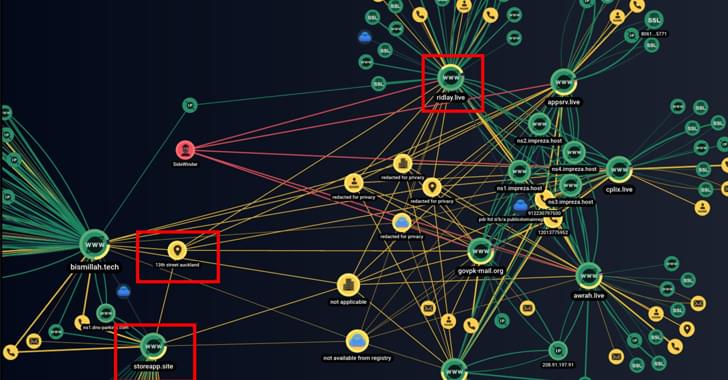SideWinder, a state-sponsored group, uses a network of phishing domains to target government and financial sectors in Pakistan and China.


ChatGPT’s capabilities in comparison are miniscule even when using GPT-4.
Claude AI, the ChatGPT-rival from Anthropic, can now comprehend a book containing about 75,000 words in a matter of seconds. This is a huge leap forward for chatbots as businesses seek technology that can churn out large pieces of information quickly.
Since the launch of ChatGPT, we have also seen companies such as Bloomberg and JP Morgan Chase look to leverage the power of AI to make better sense of the finance world. While this process has taken them at least a few months, Anthropic, with its Claude AI, can reduce the time taken to just a few seconds.

We’re currently working with companies that develop software and tools that make surgery smarter and safer while they empower surgeons and providers to improve patient outcomes, enhance operational efficiency and increase profitability with data-driven surgery using AI, automation and operating room analytics. This is where analytic components such as data lakes and warehouses are already making a difference in healthcare. We’ve seen them capable of powering millions of facts and patient records at a time. Tied to expertise, these tools allow data-informed decisions for measurable improvements in clinical, financial and operational aspects.
For instance, we’ve helped design and develop surgical applications to improve operating room efficiency, tele-surgery, data lake construction and surgical analytics. Clients come back with feedback on our skills and technical experience, feeling supported by the flexibility and technical boost we give their teams.
Collaboration between technology outsourcing companies and healthcare providers can result in considerable optimization, including improved patient care and maximized processes. Tech providers can strive for the perfect collaborative balance with the above key conversations while boosting robust ecosystems, shared platforms and data.


Twitter CEO Elon Musk has bought around 10,000 graphics cards and is hiring AI experts to build a ChatGPT competitor within Twitter, Insider reports.
That’s despite the billionaire CEO repeatedly voicing concerns over AI chatbots like ChatGPT, and even signing an open letter calling for a six-month moratorium on developing AIs more advanced than OpenAI’s GPT-4.
Training a large language model like OpenAI’s highly popular AI chatbot takes a lot of computational power, which means Musk had to dig deep in his sizeable pockets — tens of millions of dollars, according to Insider — to finance the project.
The costs used to recover the deposits for the failed US regional banks will be paid by other US banks especially the larger banks.
The largest US lenders face billions of dollars in extra fees to replenish the government’s bedrock deposit insurance fund. The move comes after the fund was tapped to backstop uninsured depositors at Silicon Valley Bank and Signature Bank. Su Keenan reports on Bloomberg Television.
Follow Bloomberg for business news & analysis, up-to-the-minute market data, features, profiles and more: http://www.bloomberg.com.
Connect with us on… Twitter: https://twitter.com/business Facebook: https://www.facebook.com/bloombergbus… https://www.instagram.com/quicktake/?…
Twitter: https://twitter.com/business.
Facebook: https://www.facebook.com/bloombergbusiness/
Instagram: https://www.instagram.com/quicktake/?hl=en
Customers will be ordering food from AI.
#Wendys #Google #yahoofinance.
Yahoo Finance culinary correspondent Brooke DiPalma joins the Live Show to discuss the partnership between Wendy’s and Google to revolutionize drive-thru orders with the use of AI technology, first premiering in Columbus.
Ohio in June of this year, and how AI is transforming the restaurant industry.
About Yahoo Finance:
At Yahoo Finance, you get free stock quotes, up-to-date news, portfolio management resources, international market data, social interaction and mortgage rates that help you manage your financial life.
Yahoo Finance Plus: With a subscription to Yahoo Finance Plus get the tools you need to invest with confidence. Discover new opportunities with expert research and investment ideas backed by technical and fundamental analysis. Optimize your trades with advanced portfolio insights, fundamental analysis, enhanced charting, and more.

NeaChat is an AI-powered chatbot developed based on ChatGPT, serving users in various industries such as education, research, finance, healthcare, and law.
Wuhan, China, May 6, 2023 (GLOBE NEWSWIRE) — The NeaChat team is honored to announce that it has obtained access to OpenAI’s latest generation of artificial intelligence language model GPT-4, becoming one of the first teams in China to obtain authorized access to GPT-4 is a powerful AI model with excellent natural language understanding and generation capabilities, with significant improvements in functionality and performance over its predecessor, GPT-3.5.
The core advantages of GPT-4 lie in its vast knowledge base, efficient problem-solving capabilities, natural language generation, and wide range of applications. We believe that the introduction of GPT-4 will bring a richer and more intelligent experience to NeaChat users.

Servers running software sold by Salesforce are leaking sensitive data managed by government agencies, banks, and other organizations, according to a post published Friday by KrebsOnSecurity.
At least five separate sites run by the state of Vermont permitted access to sensitive data to anyone, Brian Krebs reported. The state’s Pandemic Unemployment Assistance program was among those affected. It exposed applicants’ full names, Social Security numbers, addresses, phone numbers, email addresses, and bank account numbers. Like the other organizations providing public access to private data, Vermont used Salesforce Community, a cloud-based software product designed to make it easy for organizations to quickly create websites.
Another affected Salesforce customer was Columbus, Ohio-based Huntington Bank. It recently acquired TCF Bank, which used Salesforce Community to process commercial loans. Data fields exposed included names, addresses, Social Security numbers, titles, federal IDs, IP addresses, average monthly payrolls, and loan amounts.

Join top executives in San Francisco on July 11–12, to hear how leaders are integrating and optimizing AI investments for success. Learn More
With the risks of hallucinations, private data information leakage and regulatory compliance that face AI, there is a growing chorus of experts and vendors saying there is a clear need for some kind of protection.
One such organization that is now building technology to protect against AI data risks is New York City based Arthur AI. The company, founded in 2018, has raised over $60 million to date, largely to fund machine learning monitoring and observability technology. Among the companies that Arthur AI claims as customers are three of the top-five U.S. banks, Humana, John Deere and the U.S. Department of Defense (DoD).